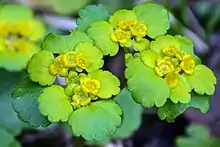| Chrysosplenium oppositifolium | |
|---|---|
 | |
| Scientific classification | |
| Kingdom: | Plantae |
| Clade: | Tracheophytes |
| Clade: | Angiosperms |
| Clade: | Eudicots |
| Order: | Saxifragales |
| Family: | Saxifragaceae |
| Genus: | Chrysosplenium |
| Species: | C. oppositifolium |
| Binomial name | |
| Chrysosplenium oppositifolium L.[1] | |
| Synonyms[1] | |
| |
Chrysosplenium oppositifolium, the opposite-leaved golden-saxifrage,[2] is a species of flowering plant in the family Saxifragaceae, native to Europe (Belgium, Czechoslovakia, Denmark, France, Germany, Great Britain, Ireland, Italy, Netherlands, Norway, Poland, Portugal, Spain, Sweden, Switzerland and former Yugoslavia).[1] It was first described by Carl Linnaeus in 1753.[3] The plant can tolerate low light levels down to 24 lux.[4]

Flowers
References
- 1 2 3 "Chrysosplenium oppositifolium L.", Plants of the World Online, Royal Botanic Gardens, Kew, retrieved 2020-08-04
- ↑ BSBI List 2007 (xls). Botanical Society of Britain and Ireland. Archived from the original (xls) on 2015-06-26. Retrieved 2015-02-25.
- ↑ "Chrysosplenium oppositifolium L.", The International Plant Names Index, retrieved 2020-08-04
- ↑ British Cave Research Association - Life in the entrance
This article is issued from Wikipedia. The text is licensed under Creative Commons - Attribution - Sharealike. Additional terms may apply for the media files.